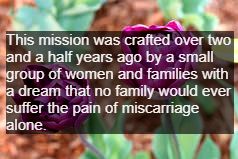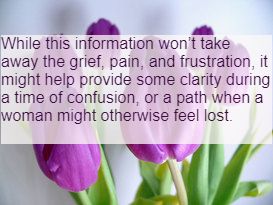|
In this edition of the Hope Blooms podcast, Emily talks with Dr. Marguerite Duane. Dr. Duane is co-founder and Executive Director of FACTS. A Board-certified family physician, she serves as an Adjunct Associate Professor at Georgetown University, where she directs an introductory course on natural or fertility awareness based methods (NFP/FABMs) of family planning.
She is also a physician with Modern Mobile Medicine, a direct primary care (DPC) house calls-based practice serving patients of all ages in the D.C. metropolitan area. She has served on the board of the American Academy of Family Physicians (AAFP) and the Family Medicine Education Consortium (FMEC). In this episode, Dr. Duane explains various terms associated with pregnancy loss and common treatments following an early pregnancy loss. She also discusses popular questions from women and families following a miscarriage. *All information in this podcast is intended for educational purposes only. Information is not intended to diagnose, prescribe, mitigate, or cure any symptoms or disease. Please consult your doctor with any questions concerning your health.*
0 Comments
By: Emily Carrington EPLA Founder The best advice I ever received following a miscarriage came from a dear friend in the tender hours after my first loss. As I told her what had happened she listened quietly and then responded, “have you thought about doing something in honor of your little one?” This idea brought comfort, hope, and a small sense of control. Bombarded by all of the thoughts of the things I couldn’t do with or for this child, I realized the one thing I could do: remember. So I got to work “remembering.” I made a plan. Beyond the service and the memory box, I would also purchase a single purple rose on Baby’s due date each November. That way, Baby would always have a space in our family. Then I miscarried again only a few months after losing my first. We had another service and added stuff to the box. I also received a few thoughtful gifts to serve as memorials. I resolved to buy a flower for this child, too, every April. November came and I bought Baby’s flower. This helped me heal as the due date stirred up so much raw emotion and loneliness. I needed Baby. How could I ever forget? Then April came and I bought another flower. During that first year I also bought ornaments, attended loss mom events, received memorial gifts, lit candles, and made donations in honor of my children. I had to do something to give them a space in this world. Then August came and I miscarried again. By November I felt exhausted by the idea of keeping up with all of my memorials, like buying flowers, and I started forgetting death dates and due dates. With three losses, I had six special dates and remembering them became a burden. I felt guilty and confused. If I didn’t remember my children, who would? Four years later I realize that I have never forgotten my children, even if I can’t remember their due dates. I have since abandoned rigid memorials and rest on the memorials that I set in place at the time of each loss.
As I unwrapped Christmas ornaments this year, I came across two ornaments purchased in honor of our first two children lost to miscarriage. I took time to remember each of them and then gently joked with myself that the third child we lost to miscarriage never did get an ornament because, well, isn’t that how it goes with third children? Whether you have recently lost a child in early pregnancy or you are years past from your loss, the holidays can be a time of both difficult and fond memories as you think of your children. While I never have to be reminded of my children, I have found that the exercise of remembering has brought the comfort, hope, and control that I longed for. Even if it isn’t at the frequency or intensity of that first year, I still take the time to remember my children through many of the same activities. I have found that my lost children are on my mind particularly during October (Pregnancy and Infant Loss Awareness Month) and December. If you are looking for a way to honor and remember the life of your little one this holiday season, consider some of these ideas that can be done privately, with family, or shared publicly.
What are some ways you remember your little ones during the holidays? Emily Carrington is the founder of the EPLA and mother to four children. By: Kathy Petersen I found out I was pregnant with my second baby when my oldest was only 9 months old. We were pretty overwhelmed, but excited, and went to the first OB appointment at 10 weeks. We didn’t hear a heartbeat. Our physician gave us encouragement that it was still early, position and size of the baby could affect the ability to hear the heartbeat, and said, “we’ll just check next time.” Four weeks went by and at my 14-week appointment, there was still no heartbeat. My OB sent me for an ultrasound to confirm, and while I was no ultrasound expert, there was no movement, no heartbeat, and no life on the screen. I went home sad, disappointed, and a little unsure of what I was supposed to do or expect. This new information didn’t just change that day; it changed that week, the next nine months, the next 18 years, the rest of my life. But 20 years later and as a mother of eight, I have come to realize that every experience in our journey of motherhood, every joy and every suffering, changes us. We grow, we learn, we adapt, we cope. Every experience, my miscarriage included, has shaped who I am as a mother. I didn’t expect that my miscarriage would shape who I am as a nurse as well. As a labor and delivery nurse for 20 years, I have been at the side of many women who have had a pregnancy loss. I have cried with them, taken pictures for them, and just sat at their bedsides. Women who experience a pregnancy loss need postpartum care: physical needs like Tylenol and Motrin, pads, and fluids, but also emotional needs like visits, meals, and friends. People know how to celebrate babies, but most people are uncomfortable supporting others during a miscarriage. It’s not easy, but those of us who have had miscarriages should be first in line to be present to others who have sadly joined us. Groups like the Early Pregnancy Loss Association are a great support and are helping to bring the topic of early pregnancy loss into the light so that no woman feels alone. Women might also experience something similar to postpartum depression after a miscarriage, though there is debate as to whether it is actually postpartum depression or not. A drop in hormones coupled with the emotional event of losing a baby can trigger extreme anxiety and other mental health issues.
Many women may think that because the pregnancy ended early, postpartum symptoms like this are not possible. They are, and no loss mother should feel ashamed to ask for help. The emotional and spiritual struggle following miscarriage does not always look like “depression;” it often manifests in anxiety, the inability to sleep, confusion or being overwhelmed, obsessive thoughts or extreme focus. Women experiencing these symptoms should seek medical attention. Mothers who have lost babies early in pregnancy should know that they are not alone, and that their grief may spread into many areas of their life. Women who have suffered losses previously can and should reach out to those miscarrying, helping them carry their burden and supporting them by working to address both their physical and emotional needs. Kathy Petersen is an RN and mother of 8 By: Maria Servold EPLA Editor I often wish the Early Pregnancy Loss Association was established years ago, as I could have benefited directly from what we are creating now: resource folders to place in doctor’s offices, churches, and emergency rooms, and care kits to help with the physical needs of a miscarriage. Without these resources, my story of miscarriage was one of confusion and isolation. In September 2012, I was nine weeks pregnant with my first child when I suddenly began bleeding late one evening. My husband and I rushed to the local emergency room, where I eventually was given a “stall” and seen by the ER doctor on shift. After determining that I was most likely miscarrying “the products of conception” (as he called the baby) he sent me on my way home. For the most part, the visit was business-like and sterile. I felt as though no one really cared about what I was experiencing Thankfully, there was one ER nurse who saw me in tears and, once she heard what was happening, gave me a big hug. I am still grateful for her. While I didn’t expect to be cuddled and loved by the ER staff (they are medical professionals, not counselors), I left the hospital feeling lost and confused. What had just happened? Why had it happened? Should an OB-GYN have examined me before leaving? I had more questions than answers and a broken heart on top of it. I later learned that the ER was in fact the right place for me to be seen, not the labor and delivery unit, as I was less than 20 weeks pregnant. But, it seemed like no one in the emergency room was prepared to handle a mother grieving a miscarriage that night. This is one of the ways EPLA can help. We provide resource folders and miscarriage care kits in local hospitals and doctors offices that medical professionals can provide to grieving mothers who come in during or after a miscarriage.
These educational resources help close the knowledge gap for a woman going through what I went through. While this information won’t take away the grief, pain, and frustration, it might help provide some clarity during a time of confusion, or a path when a woman might otherwise feel lost. The miscarriage care kits consist of comfort and sanitary items to help a woman navigate a very difficult emotional and physical experience. These care kits have been donated and assembled by women and families who have been there, and through these kits EPLA hopes to reduce feelings of loneliness and isolation. While my miscarriage was one of the hardest things my husband and I have had to go through, I am grateful for the opportunity to work for EPLA and help other women with our resource folders and care kits, in hopes that their suffering may be eased a little. Maria Servold is an Editor at the EPLA, Assistant Director of the Herbert H. Dow II Program in American Journalism, and Lecturer in Journalism at Hillsdale College By: Nick Carrington EPLA Editor Over the weekend, Michelle Obama revealed that she had a miscarriage roughly 20 years ago, saying she felt “lost and alone” and as if she had “failed” because of the hushed culture that surrounded miscarriage. The self-blame is something many women experience, caused in part by most people not knowing how common miscarriages are. The thinking often goes that “if they don’t’ happen often, I must have done something to cause this.” The vast majority of the time, that’s just not true. Without a public conversation around miscarriage in the past, women and families were left alone to make sense of their tragedy, assigning blame to themselves in the process. But the fact that a former first lady can vulnerably discuss her miscarriage openly and accurately describe what so many women have felt over the years means that we have made progress. For that I am grateful. Women and families no longer need to speak in hushed tones to only their closest confidants about their miscarriages unless that’s the way they choose to grieve. The culture of silence has given way to healthy, child-affirming conversations. Mrs. Obama’s remarks provide important evidence that the conversation has become mainstream, though she certainly isn’t the first public figure to talk about her miscarriage. In 2015, Mark Zuckerberg disclosed that his wife, Priscilla Chan, suffered three miscarriages before they had their first child. Zuckerberg called the loss of their first three children a “lonely experience” in part because people don’t talk much about miscarriage. Zuckerberg’s candidness was praised by many as an important step to ending the stigma surrounding miscarriage. The tech giant and his wife gave voice to millions of families who experience the joy of getting pregnant and dreaming of who their child will be and then losing those dreams to child loss. Many others from the entertainment world have also chimed in. In September, Carrie Underwood revealed that she had three miscarriages in roughly a year’s time. Through tears, she described the anguish of losing multiple children, fighting through the peaks and valleys that pregnancy and pregnancy loss bring.
Underwood also detailed her conversations with God, a reminder that miscarriage is more than just a physical and emotional battle for families; it’s a spiritual one as well. The openness of a first lady, a tech giant, and an entertainment queen show us that pregnancy loss affects people from all walks of life. But it also indicates a healthy change in the culture. There is no shame in having a miscarriage, and we need influential figures to reinforce that message and to remind families that others understand their painful experience. I’m grateful for the words of all of those who re-lived their grief to the benefit of others, whether famous or not. These stories are a significant step toward a big goal of ours: that no family suffers miscarriage alone. Nick Carrington is an Editor for the EPLA and Assistant Professor of Professional Writing at Cedarville University By: Heather Heritage As I grieved my miscarriage, I was surprised to find that what stayed with me most was how people responded when I shared my sad news. Understandably, many were shocked. Some people knew I was pregnant, so a matter of fact, “We lost the baby” reply was my response to questions about how I was feeling. Others didn’t even know I was pregnant, which made the conversation a bit awkward because I also had to provide a backstory. Once I opened up and shared my story, it felt like I joined a club that no one wants to be a member of. The commonality of miscarriage binds us together. Most women know someone who has gone through early pregnancy loss. I shared, so they shared. It was cathartic and healing; we bonded in an unfortunate sisterhood. Other women who had gone through it knew the grief, the awful experience, the dashed hopes, and the fear. I remember many of the caring responses I received, and those who gave them still stand out in my mind. They are kindred spirits - men and women who had gone through it themselves or understood the grief. The amount of helpful, kind responses I received completely outweighed the hurtful ones. However, blurred together are the hurtful responses I did receive. They did not help me grieve, and sometimes layered on more confusion and pain. When someone shares news that is surprising, shocking, or sad, it is sometimes difficult to respond with empathy. But, responding to what a person has been through with empathy acknowledges their humanity. An un-empathetic response can devalue a person as a human being. It is one of the cruelest ways we communicate, and most of the time it happens accidentally. We just don’t know how to respond or what to say. So we go with what makes us feel better. Empathy takes work, practice, and concentration. It’s much easier to respond with clichés or murmurs than to deal with listening for the raw emotions hidden in tone and what’s not being said. When we are not being empathetic, we tend to respond in ways that make us feel most in control of the situation. Here are five examples of what NOT to say to someone who has experienced an early pregnancy loss, because these responses can minimize the grief a person is going through. 1. Solving the Problem Examples include: “I know what you could do,” or “Let me fix this.” “My doctor could help you.” 2. Unsolicited Advice Examples include: “My friend had the same problem. This is how she handled it.” “Check your medicine. Are your sure you are on the right one?” Or, suggesting a particular “fix.” 3. Dismissing Feelings Examples include: “It’s not that big of a deal,” or “you’ll be OK.” “At least it was early.” “You’ll be able to have another baby.” “These things happen.” “It’s providence.” 4. Self-Promotion Examples include: “That same thing happened to me,” or “Be happy it wasn’t worse” (followed by a comparison of some sort). “Well, I was 18 weeks and had to have a D&E – that was awful.” 5. Silence Examples include: ignoring the message or speaker completely, or responding with a quick “that’s too bad,” or “Oh yeah, so-and-so told me about that,” before changing the subject. Do any of these sound familiar? If we’re being honest, we’ve probably all used one of these negative responses at some point with someone sharing difficult news. So how do we respond with empathy? Here are some things others did that helped me when I was going through my loss.
1. Listen carefully and quietly. If someone is sharing a raw moment with you, listen to them. This also means you can’t listen to your internal dialogue. Stop thinking about what you are going to say next and be in the moment. 2. Be aware of your nonverbal communication. Where is your gaze? Straying glances indicate discomfort or that you have something better to do. What do your facial expressions look like? Authentic concern is obvious to the speaker. It’s easy to see. Show it. 3. Listen for emotions. If they say something particular about how their feeling or give name to their emotion, you have permission to respond to it. If they don’t name an emotion explicitly, take your best guess using some descriptive emotional words. Not sure what these are? Start here with Plutchik’s Wheel of Emotions. A simple, “I’m so sorry this is happening to you. It really sucks. I am here for you, and I love you,” will suffice. Paying attention to others’ needs, listening, and communicating empathetically will change your relationships for the better. Going through a pregnancy loss forced me to acknowledge my own areas of weakness in responding with empathy and truly listening to others. Sometimes, you really do have to walk a mile in another’s shoes to understand a situation. Through that, you can see the hurt you may have caused without realizing it. But, thankfully, these experiences can encourage growth and understanding. After all, the one thing that could change the world, person by person, is a bit more empathy. Heather Heritage is an Assistant Professor of Communication at Cedarville University and has worked in both health communications and public relations By: Emily Carrington EPLA Founder One year ago EPLA delivered the first 100 Educational Resource folders to the Hillsdale Hospital. Since then over 300 folders have been distributed around the country. And this is only the beginning of the amazing growth this organization has experienced recently. In 2018 EPLA accomplished the following:
As our services blossomed so has our support. This summer EPLA received a generous grant from the Hillsdale County Community Foundation, and this fall we held a very successful Tulip Bulb Sale. We have also seen a significant increase in individual donations. And 2018 isn’t even over yet! After years of planning, organizing, researching, and working hard, we are in a season of rapid growth, and we certainly don’t take this for granted. We have so much to be grateful for.  It is our mission to help bear the burden of grief for women and families who have experienced the isolating heartache of early pregnancy loss by encouraging community, contributing to public discourse, and providing educational and financial resources for professionals and families. This mission was crafted over two and a half years ago by a small group of women and families with a dream that no family would ever suffer the pain of miscarriage alone. While there is much to be done, we are so grateful that we are able to work each day to this end. On a personal level I am grateful that I have the opportunity to honor my three deceased little ones in this way. Their short little lives changed my heart, opened my eyes, and brought forth a compassion for others like I had never known. To serve others in memory of my first three children is an honor, and for that I am grateful. This holiday season EPLA is taking special time to express our gratitude. While the list of things for which we are grateful is quite long - it can be summarized in one sentence: Dear reader, supporter, and friend, we are grateful for you. The EPLA podcast will feature medical professionals, EPLA representatives, and people from like-minded organizations discussing the following topics:
In the inaugural EPLA podcast, Emily Carrington, Founder of the EPLA, discusses why she started the organization, what the EPLA has accomplished to this point, and what we hope to do in the future. |
Archives
December 2023
Categories
All
|







 RSS Feed
RSS Feed